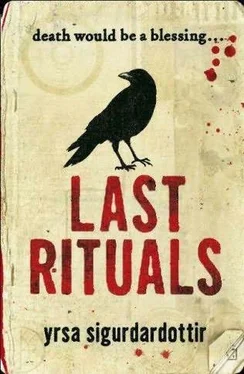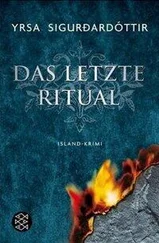Gunnar stood up, his face flushed. "I see." He did not feel confident about saying anything more at this stage, but turned around in the doorway to ask one final question that had been plaguing himeven though he would have liked to storm out, slamming the door. "Don't you have any idea what this letter was about? You say the collection was examined thoroughly, someone must remember."
Maria shook her head. "Bogi had a vague recollection. He was researching the establishment of the Zealand diocese in Denmark and its effect on Icelandic ecclesiastical history. That was quite a long time after the letter was written, so he didn't study it closely. But he did remember that it was difficult to make sense of, something to do with hell, plague, and the death of an emissary. That was all I could drag out of him without arousing his suspicions about how things stand."
"I'll be in touch," said Gunnar as he left. He went out and closed the door behind him without waiting for Maria's farewell.
One thing was certain. He had to find the letter.
Thora spun around slowly on the shiny parquet floor of the huge living room. It was decorated in the smartest of minimalist styles. The few pieces of furniture in it had certainly cost a fortune. Two large, elegant black leather couches were arranged in the middle of the room, considerably lower than the sofas Thora was accustomed to. She yearned to sit down on one but did not want to imply to Matthew that this was all new to her. Between the two sofas was an even lower coffee table that looked to Thora as if it had no legsthe surface almost seemed to be resting on the floor. She tore her eyes away from the furniture and gazed along the walls. Apart from a flat screen in the center of one, all the works of art displayed there looked ancient. A number of old objects had been arranged too, including a clumsy wooden chair that Thora took to be a replica rather than an original. She wondered whether Harald had taken an active role in the look of the room himself or an interior designer had arranged everything. Such a hybrid of old and new gave the area a very unusual and personal character.
"How do you like it?" asked Matthew casually. His tone suggested that he, unlike Thora, was accustomed to wealth.
"It really is a very smart place," she answered, walking over to one of the white walls to examine a framed copperplate etching that looked very old. She noticed the theme and stepped back at once. "What in God's name is that?" The copperplate was action-packed and it must have been an enormous effort for the artist to fit all the people into the scene. There were about twenty characters in this pale picture, mainly males, deftly arranged in pairs with one torturing the other or punishing him in some way.
Matthew went over to her and looked at the picture. "Oh, that." With a slight grimace he continued: "This is a picture that Harald inherited from his grandfather. It's German and depicts the situation there in sixteen hundred and something when the religious wars were at their height." Matthew turned away from the picture. "What makes it unique is that it is contemporary. In other words, it's not a later interpretation of the situation. Those works are often less realistic, more exaggerated. Although they may be a little stylized."
"More exaggerated?" Thora exclaimed. What could be more exaggerated than this?
"Well, sort of." Matthew shrugged. "Through my work for the Guntliebs I've found out a little about this period and, believe me, it's far from the most disgusting piece in their collection." He smiled wryly. "You could almost put this in a child's room compared with some of the other ones."
"My daughter's got a picture of Minnie Mouse on her wall," said Thora, moving on to the next picture. "You can rest assured a picture like that would never go on her wall, nor any other in my home."
"No, it's not for everyone," Matthew answered, following Thora to a picture of a man being tortured on a rack in front of men dressed in cowls. The men sat hunched together, intently watching two executioners who seemed to be using all their strength to turn the wheels of the rack. Presumably the idea was to stretch the victim's limbs to increase his suffering. Matthew pointed at the center of the work. "This one shows torture by the Inquisition and it's also from Germany. They put great effort into extracting confessions, as you can see." He looked at Thora. "I'm sure it's interesting for you as a lawyer to understand the roots of torture because in Europe it can be traced back to lawin the broadest sense, that is."
Thora prepared for yet another insult to her professionshe had been forced to put up with them ever since she embarked upon her legal degree. "Of course, we lawyers are responsible for all this."
"No, joking aside," replied Matthew. "In the Middle Ages, prosecutions were brought by individuals. Anyone who thought he had been the victim of wrongdoing or criminal conduct had to bring charges himself and prosecute the case. The trials were a joke really. If the accused did not just confess to the court or there was no clear proof of his guilt, it was left to God to decide. Accused people were made to undergo ordeals, walk over burning embers, being thrown into water in a sack, and so on. If their injuries healed after a certain time, or if they sank in the water, they were deemed innocent. Then the accuser was in trouble, because he would face trial. Understandably, people were reluctant to bring charges against others because of the risk that the case would turn against them."
Matthew pointed at the man on the rack. "Eventually that approach was replaced by this system when the authorities and the Church realized there had been a huge increase in secular and religious crimes because the courts were impotent. To cut crime they had to resort to Roman law, which had a different arrangement for bringing charges and prosecuting them. This was based on investigation, which is where the Inquisition comes from. Where the Church led, the secular courts followed, and in this new system the victim no longer needed to bring charges or prosecute the case." Matthew smiled triumphantly. "Ergolawyers."
Thora smiled back. "It's a bit rich to blame lawyers for all this misery." It was her turn to point to the anguished man on the rack. "Excuse me, but I don't quite see the connection between investigation and torture."
"No," said Matthew. "Unfortunately there was a flaw in the new arrangement. In order to find someone guilty, either two witnesses or a confession was needed. Some crimes, such as blasphemy, aren't necessarily witnessed, so everything depended on confessions. Judges needed them, and they could be obtained by torture. That was deemed to be an investigation."
"Disgusting," declared Thora, turning away from the picture to face Matthew. "How do you know all this?"
"Harald's grandfather was a mine of information about this period and a passionate raconteur. His accounts were great fun to listen to, but I have only a very superficial knowledge of this compared with him."
"Well, well," Thora said. "Have you seen all these pictures before?"
Matthew looked along the wall. "Most of them, as far as I can see. Actually these are only a fraction of the pictures and other items in the collection. Harald obviously only brought part of it with him. His grandfather spent much of his life collecting it all. And who knows how much money he spent on it. I would imagine it's the most remarkable collection in the world dedicated to torture and executions through the ages. One part is an almost complete set of the different editions of Malleus Maleficarum. "
Thora looked around the room. "Was the collection just hanging on the living room walls?"
"No, are you mad?" replied Matthew. "The books and other documents, letters and such, are stored in a bank vault because they are so valuable. And there are two special halls in the Guntlieb home housing the part of the collection that's on exhibit. I don't expect they were particularly upset at losing some of the works. Most of the family hated them; Harald's mother, for example, could never be persuaded to go in there. Harald was the only descendant who shared his grandfather's interest. That was surely the reason his grandfather bequeathed the collection to him."
Читать дальше












